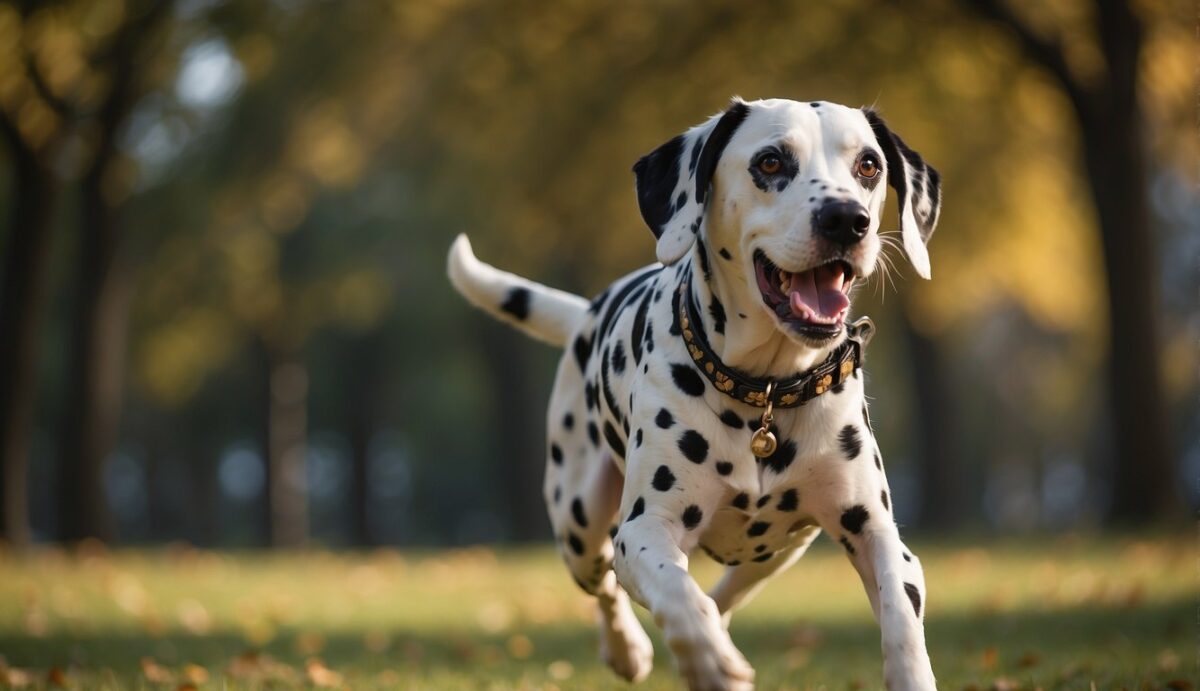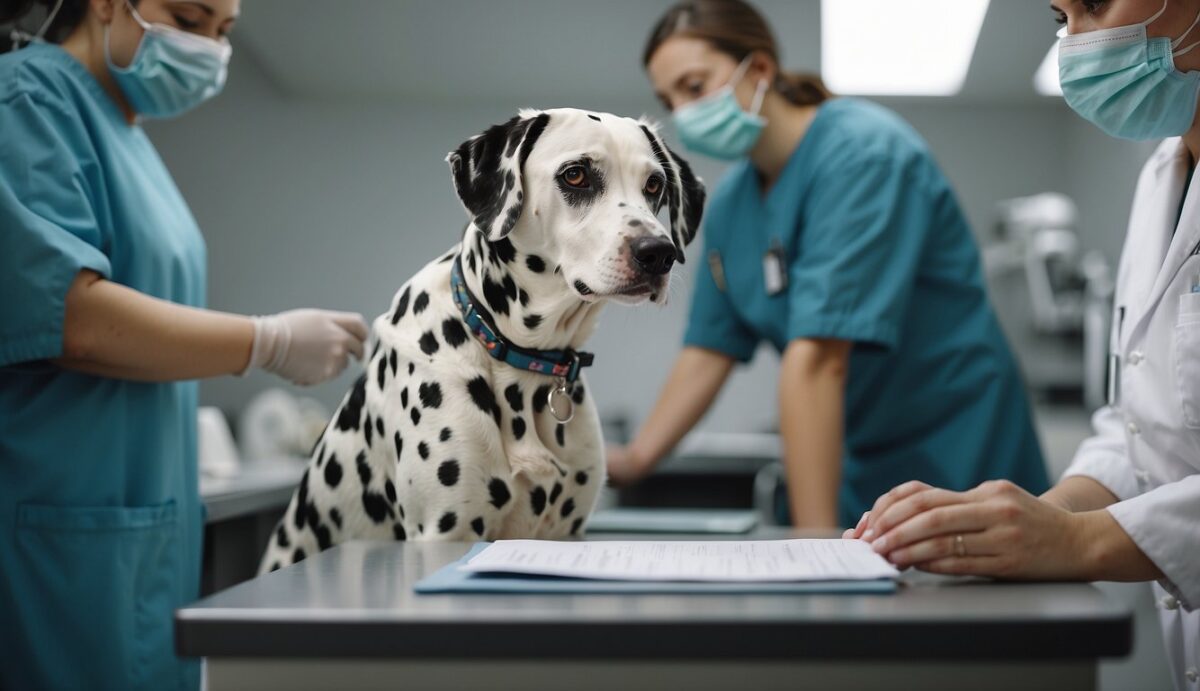When it comes to the health of Dalmatians, reproductive care is an aspect that deserves special attention. This breed, with its distinctive coat and noble history, has particular needs that are crucial for responsible owners to address.
Your Dalmatian’s reproductive health impacts not just the potential for future generations, but also plays a significant role in their overall well-being.
Understanding the unique genetic makeup of Dalmatians, from their iconic spots to their specific health predispositions, is essential in providing the right care.
As you embark on the journey of caring for a Dalmatian, awareness of their dietary requirements, exercise needs, and grooming routines will help maintain their health through all stages of life, including reproductive phases.
Keeping your Dalmatian healthy requires a blend of nutrition, regular check-ups, and careful attention to their lifestyle, all of which contribute to a thriving life.
Key Takeaways
- Reproductive health is integral to your Dalmatian’s overall well-being and requires specific attention.
- A thorough understanding of your Dalmatian’s unique needs ensures a healthy, active life.
- A blend of proper diet, exercise, and regular veterinary care supports your Dalmatian’s reproductive health.
Health and Genetics

When caring for a Dalmatian, it’s essential to consider their unique health and genetic predispositions. These factors play a significant role in maintaining their well-being throughout their lives.
Common Health Concerns
Your Dalmatian’s health requires vigilance as they are prone to certain conditions. Keep an eye out for these concerns:
- Skin Allergies: They can manifest as itching or inflammation. Regular checks and prompt veterinary care can help manage skin health.
- Urinary Stones: Dalmatians may develop urinary stones, which require monitoring their diet and hydration.
- Deafness: Unfortunately, deafness is not uncommon. Testing by your vet can determine this early on.
- Eyes: Routine check-ups are necessary to catch any issues with their eyesight.
Genetic Predispositions
Understanding the genetic tendencies of Dalmatians assists in preemptive health care:
- Hip Dysplasia: Your vet may recommend screenings for this genetic joint condition.
- Bladder Stones: Linked to genetics, awareness of diet can prevent stone formation.
- Dilated Cardiomyopathy: Check with your vet about monitoring your dog’s heart health.
Proper vaccinations and regular visits to the veterinarian are key in preventing infections and ensuring that any genetic health concerns are addressed promptly.
Keeping their nails trimmed also helps avoid overgrowth and associated issues.
Reproductive Care

When ensuring the reproductive health of your Dalmatian, it’s important to focus on responsible breeding practices and understand the nuances of pregnancy and whelping. These key aspects help in maintaining the health of both the mother and her puppies.
Breeding Practices
To begin with responsible breeding practices, you should only breed Dalmatians who have been health screened for genetic conditions prevalent in the breed.
As a breeder, establish a relationship with a veterinarian specializing in reproductive health to ensure your dogs receive proper care throughout the breeding process. Here are some steps to follow:
- Health Screening: Ensure both the male and female are tested for hereditary issues, specifically deafness and kidney stones, which Dalmatians are prone to.
- Breeder Ethics: Work with breeders who focus on enhancing the breed’s health, temperament, and conformation to standards.
- Timing for Breeding: Consult with your veterinarian to identify the optimal time for breeding, which is typically determined through a combination of physical signs and hormonal tests.
Pregnancy and Whelping
Pregnancy in Dalmatians should be closely monitored by your vet. Your dam (mother dog) will require different nutritional needs and may need adjustments in exercise routines during her pregnancy.
Here’s what you need to know about caring for her during this time:
- Veterinarian Check-ups: Regular vet visits are crucial for monitoring the health of the dam and the development of the puppies.
- Diet & Nutrition: Ensure the dam has a balanced diet rich in nutrients; she may need higher caloric intake as the pregnancy progresses.
- Whelping Preparation: Set up a clean and quiet whelping area weeks before the due date for the dam to get comfortable with.
- Understand Whelping Process: Educate yourself on the whelping process and know when to seek immediate veterinary intervention.
Vaccinations for the dam should be up to date before mating, as maternal antibodies will help protect the newborn puppies until they are ready for their own vaccinations.
After birth, a veterinarian should examine the puppies to verify they are healthy and initiate a vaccination and deworming schedule.
Nutrition and Diet

Your Dalmatian’s health significantly depends on a balanced diet catered to their specific nutritional needs. Ensuring your dog gets the right amount of nutrients, including proteins, vitamins, and minerals, is essential for their physical and mental well-being.
Dietary Requirements
Dalmatians require a carefully curated diet that meets their energy levels and supports their active lifestyle.
Given their predisposition to urinary stones, a low-purine diet is advisable to prevent health issues. Your dog’s diet must include:
- High-quality protein: Essential for muscle and bone growth, particularly in puppies.
- Vitamins and minerals: Crucial for their overall health.
- Water: Always provide access to clean, fresh water to stay hydrated.
Managing Weight
Maintaining a healthy weight for your Dalmatian involves monitoring their:
- Caloric intake: Adult Dalmatians typically need between 1075 and 1500 calories daily.
- Exercise routine: Ensure regular exercises to burn excess calories and maintain muscle tone.
Here’s a simple guideline to manage your dog’s treat intake:
| Food Type | Percentage |
|---|---|
| Main meals | 90% |
| Treats | 10% |
Balance is key — too little food and your Dalmatian may lose weight; too much, and they could become overweight, which hinders their physical activity and can lead to health issues.
Exercise and Activity

Dalmatians are a breed teeming with energy and an innate need for daily exercise and activity.
To keep your Dalmatian happy and healthy, you need to provide them with sufficient physical and mental stimulation every day.
Daily Exercise Needs
Your Dalmatian’s active lifestyle calls for dedicated daily exercise to maintain optimal health. Let’s break down what you should aim for:
- Puppies: 5 minutes of exercise per month of age, twice a day. For example, a 3-month-old puppy should have 15 minutes of exercise two times daily.
- Adults: Aim for at least 30 minutes to an hour of exercise daily, which can include walks, runs, or jogs.
- Adults: High energy levels in adults necessitate more intense exercise like longer runs or engaging in activities that also provide mental stimulation.
Remember to adjust the intensity and duration of exercise to your dog’s age and health status.
Engaging Activities
Providing a variety of engaging activities keeps your Dalmatian both physically and mentally stimulated. Here’s how to ensure your dog is getting the most out of playtime:
- Fetch: A game of fetch not only caters to your Dalmatian’s playful nature but also gives them a good workout.
- Agility Training: This can be a structured way to tap into their athletic abilities, offering an excellent outlet for energy and stimulating their mind.
- Companionship: Remember, Dalmatians thrive on companionship, so activities that you can do together will help strengthen your bond and provide necessary exercise.
Always tailor the activities to your Dalmatian’s interest and adjust the complexity to keep them engaged without causing exhaustion or injury.
Healthcare and Prevention

Ensuring your Dalmatian enjoys a healthy life involves regular preventive care and close attention to their unique health needs.
Establishing a routine of consistent healthcare measures will greatly contribute to their overall wellbeing.
Regular Veterinary Check-Ups
At the core of your Dalmatian’s health regimen should be routine veterinary visits.
These check-ups allow for early detection of common issues like deafness, which affects a significant number of Dalmatians.
A veterinarian can perform hearing tests and provide you with guidance on caring for a deaf dog.
It’s essential to keep a health monitoring chart based on vet recommendations, which will include:
- Vaccinations: Keeping up with a vaccination schedule is pivotal for preventing various diseases.
- Health screenings: Regular screenings can catch early signs of health issues specific to Dalmatians.
For more affordable care, consider pet insurance to help cover the costs of these veterinary services.
Preventive Measures
Taking preventive measures can mitigate potential health issues and lead to a higher quality of life for your Dalmatian. Here’s a concise list of preventive steps:
- Diet: Maintain a balanced diet tailored to the breed’s needs.
- Exercise: Regular exercise supports overall health and can prevent issues like obesity.
- Dental care: Regular teeth cleaning to prevent dental diseases.
- Parasite control: Keep up with treatments for fleas, ticks, and heartworm.
Remember, prevention is better than cure, so investing time in these areas is crucial for your Dalmatian’s long-term health.
Frequently Asked Questions (FAQs)

Caring for a Dalmatian’s reproductive health is crucial to ensuring the long-term well-being of your dog and her offspring. The following are some commonly asked questions to help you manage this responsibility effectively.
How often should Dalmatians be screened for genetic reproductive issues?
You should have your Dalmatian screened for genetic reproductive issues before breeding and then annually. This proactive approach can help identify and address potential health concerns early on.
What are the best practices for supporting a Dalmatian during pregnancy?
Offer a balanced diet and moderate exercise to your pregnant Dalmatian, and minimize stress by keeping her environment calm. Consult with your veterinarian for specific guidelines tailored to her needs.
What should I feed my pregnant Dalmatian to ensure proper nutrition?
Provide a diet rich in proteins, vitamins, and minerals that are specifically formulated for pregnant dogs. Increasing caloric intake gradually as prescribed by your vet will support your Dalmatian’s increasing nutritional needs during pregnancy.
Are there any hereditary reproductive complications specific to Dalmatians?
Dalmatians may be prone to certain hereditary reproductive issues, such as urinary stones. Discuss with your veterinarian the potential genetic risks and the appropriate screening tests for your Dalmatian.
How can I prepare a safe and comfortable environment for a Dalmatian giving birth?
Create a quiet, secluded birthing area with clean, soft bedding. The space should be easily accessible for you to assist if necessary but also private enough for your Dalmatian to feel secure during labor.
What postpartum care should be taken for a Dalmatian and her puppies?
Ensure that the mother has a clean environment and is feeding the puppies regularly.
Monitor the puppies for consistent weight gain and development, and schedule a veterinary check-up within the first few weeks after birth.

